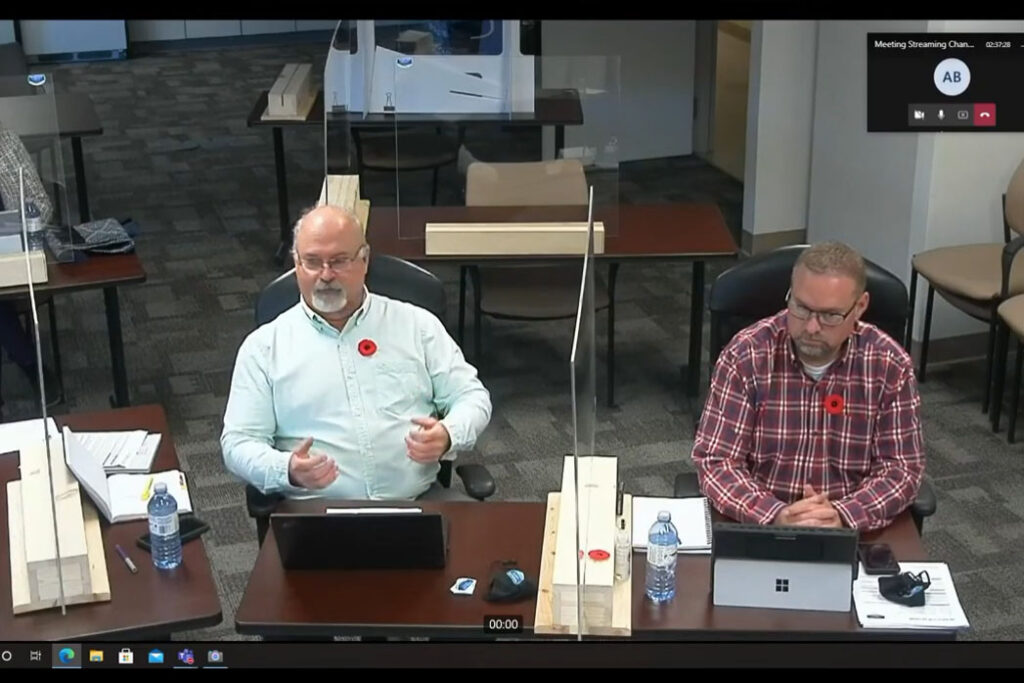
The work on Horne Road is set to continue with three recent motions by Woodlands County Council. During the November 10, meeting Director of Infrastructure Andre Bachand brought forward tender results for the next stage of the improvements. “The 2021 Capital Budget included funds for drainage and road improvements within the Horne Road subdivision area. The first phase was the improvement of the drainage throughout the area which was tendered out and awarded by Council. That work is complete.”
Bachand explained that Phase 2 would encompass road widening and some drainage improvements on Horne Road itself. “That tender was advertised, went out, and we received five bids—the lowest being PME Inc. for $273,100.00. The total cost of the project of what was spent and what we anticipated being spent is $600,607 plus tax. Our total funding is $605,656,” he explained.
The contribution coming from Woodlands County is $40,656, with the remaining majority coming through as a grant from the provincial government. Councillor Alan Deane was happy to see it. “If I understand this correctly, approximately 90 percent of this project is coming from grant funding which is great. Can you give, especially for the new councillors, an idea of how this project would qualify for grant funding? It’s fantastic that it is, but how do you identify what is grantable?”
Bachand explained that grants are based on criteria. “We submit projects that meet the criteria of the province, or the feds, identifying what works have to be done and what our anticipated costs are. We normally get council approval for that to be submitted, and then we wait for the province or the feds to determine if we get the funding or not.”
The project list included an 11% contingency amount of $30,000. Mayor John Burrows wondered why it wasn’t the ten percent they are used to seeing. “That was simply to have a round number of $30,000 instead of twenty-nine thousand something,” said Bachand. The contingency, as explained, is money just in case something happens. “If they are digging and find there’s a soft spot that was not anticipated, we have that contingency amount that we can use and not have to come back to council looking for money on that project. If there are no requirements for it, then that money does not get spent.”
Councillor Devin Williams asked how it would be decided if something was outside of the tendered amount. “Say for the soft spot, who decides if that was actually part of the job or if that’s extra money?” Director Bachand explained the process. “When tenders go out, they bid on quantities. If it’s priced per cubic metre of material excavated, then there are drawings that go with that and ground testing. The consultants determine this is what that project should be. If we find that there’s a bury pit, which is basically a bunch of trees that were buried, and it was not anticipated, then that’s additional to the project where fill material is brought in.” Bachand said that should an expenditure pop up, like the soft spot example, the County would need to approve the work before it gets done. “The consultant cannot just say, yes, do it. They consult with myself, and we determine if yes it is or if (no it’s)not.”
Councillor Peter Kuelken asked if the project was pre-engineered, meaning if engineering had already taken place. Bachand said that, yes, it had. Mayor John Burrows jumped in to say that pre-engineering and getting the planning done ahead of time is another “huge component” of Asset Management. “Oftentimes, a grant will pop up and say that we have to fit within this (motioned a space with his hands), but if we haven’t done the engineering and we don’t know the rough numbers, we can’t bid it out. We are stuck if we haven’t done that planning. This is a huge component of Asset Management.”
Councillor Kuelken then asked what would happen if a project failed. He wondered who would be responsible, the engineer or the county. “When a project takes place, there is a one-year warranty period. So, if anything fails within that one-year period, the contractor is responsible. After that one year, essentially the county is responsible,” explained Bachand.
Council voted unanimously to award the Horne Road Project to PME Ltd for the tendered amount of $273,100 plus tax. The second motion approved an eleven percent contingency for the project of $30,000 if required. The final motion saw Woodlands County Council approve $44,311.00 in engineering fees to W.S.P Engineering. Council voted the same way for all three motions. Residents can expect to see additional ditching, drainage, earthworks, and road widening as construction in the area continues.







More Stories
Community spirit shines at large-scale youth baseball event
Birthday party chaos sung beautifully by Pumpjack Players’ youth in spring musical
Gearing up for another season of cars, cruising and camaraderie